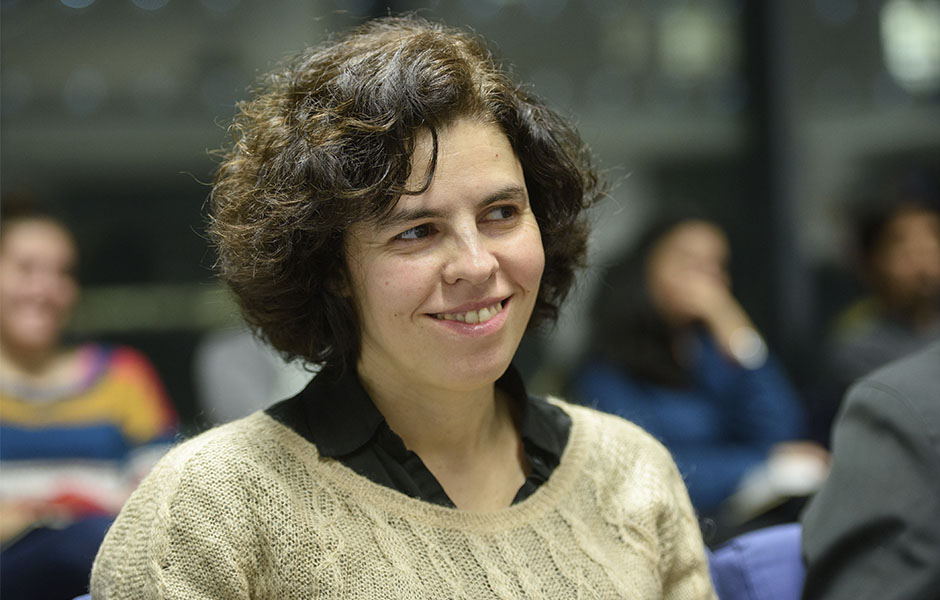Cristina Costa Santos is a researcher of the BioData group: Biostatistics & Intelligent Data Analysis at CINTESIS, a professor at the Faculty of Medicine of the University of Porto (FMUP), an enthusiast for Mathematics and Complexity Sciences and a mother always eager to be present in the life of her two children. Besides all this, she is a person with a sharp sense of humor, an insatiable curiosity, and a natural propensity for new challenges.
At school, studying Exact Sciences was like being on her “home turf”. It was, therefore, not a surprise that she earned her degree in mathematics from the Faculty of Sciences of the University of Porto. She could have taught at a school, pursued a career in as pure mathematician, or devoted herself to Applied Mathematics. She chose the third option. After finishing her studies, she tried her luck applying to a work opportunity at the former Service of Biostatistics and Medical Statistics of FMUP, chaired, at the time, by Altamiro da Costa Pereira, and she landed the job. It was the beginning of a career that has existed for more than two decades.
Cristina Costa Santos earned her Master Degree in Statistics and Information Management from the Nova University of Lisbon, and her Doctorate in Clinical and Health Services Research from the Faculty of Medicine of the University of Porto (PDICSS). Currently, she works as university professor and researcher.
As a professor, her main activity takes place at the Department of Community Medicine, Health Information and Decision (MEDCIDS in Portuguese), where she work as an assistant professor. She admits she would like to be like Richard P. Feynman, Nobel Prize in Physics, whose work she would read voraciously when she was a child, especially his classic “Surely You’re Joking, Mr. Feynman!”. She was also fascinated by the challenge of explaining in a simple way something that is complex, innovating and adapting the message to the public, with a hint of sense of humor.
Her research activity, which gives her “freedom to think”, has developed in two main fields of choice. The first is the development of statistical methods for evaluation of agreement or reproducibility, applied to Medicine in general, and more specifically to Obstetrics and Gynecology. She participated in the evaluation of the Omniview-SisPorto, an automatic method of monitoring fetal traces of cardiotocograms (CTG) during labor, in order to overcome the problem of fetal heart rate compliance or reproducibility, which causes so many lawsuits. During her Doctorate Studies, completed in 2010, Cristina Santos even developed a new statistical tool to measure reproducibility, called “Information based measure of disagreement”, which is increasingly used.
Her second research area is based on the use of Compression and Complexity Sciences to modulate chaotic systems in the field of Medicine, an area that she had also explored during her doctoral studies. The idea is to perfect tools used by physicians to improve diagnostic and prognostic capacity in this and other areas, such as diabetes or sepsis.
“We have not been able to evolve more in medicine with simple models, such as flowcharts. Linear algorithms and guidelines are very important, but those are not enough because human beings are not linear, but chaotic and complex,” she says.
In 2017, Cristina Santos was part of the group that won the first place at the CTG Challenge, in the framework of the 2nd Signal Processing and Monitoring (SPaM) in Labour Workshop, for their results in the application of linear and non-linear methods to identify signals of heartbeat associated with danger to the fetus. This work was carried out in the framework of the project NanoSTIMA – Macro-to-Nano Human Sensing: Towards Integrated Multimodal Health Monitoring and Analytics, developed by CINTESIS, INESC TEC, IT – Institute of Telecommunications and CIDESD – Research Center in Sports Sciences, Health Sciences and Human Development.
In the short term, her objective is to maintain and ideally, grow her current research group (João Santos, Teresa Henriques, Andreia Teixeira and Luísa Castro, with the support of Hernâni Gonçalves, Mohammad Nozari, Luis Antunes, Marcelo Santos and the SisPorto group), which can and is already making a difference in this field, at a national and at an international level”.
In a 10-year time, she confesses: “I would like to see our non-linear algorithms implemented in most of the current linear systems. But, for that, we need our group to be working”.

